Social cognitive career theory assessments
Home » Query » Social cognitive career theory assessmentsYour Social cognitive career theory assessments images are ready. Social cognitive career theory assessments are a topic that is being searched for and liked by netizens now. You can Download the Social cognitive career theory assessments files here. Download all royalty-free photos.
If you’re looking for social cognitive career theory assessments pictures information related to the social cognitive career theory assessments topic, you have come to the right site. Our site always gives you suggestions for viewing the maximum quality video and image content, please kindly search and find more informative video articles and graphics that fit your interests.
Social Cognitive Career Theory Assessments. A Test of Social Cognitive Career Theory Lisa Y. Social Cognitive Career Theory SCCT postulates that the career choice is an unfolding process driven by the interaction among interest self-efficacy and outcome expectations leading to the formation of goals and intentions that serve to sustain behavior over time. Lent Brown Hackett 1994 is one of the newer career theories constructed to explain and predict the ways in which individuals form career interests set goals and persist in the work environment. Social-cognitive theory is distinguished from an alternative theory of personality structure and assessment 5-factor theory by articulating the strategies of scientific explanation conceptions of personality structure and dispositions and the assessment practices that differentiate the approaches.
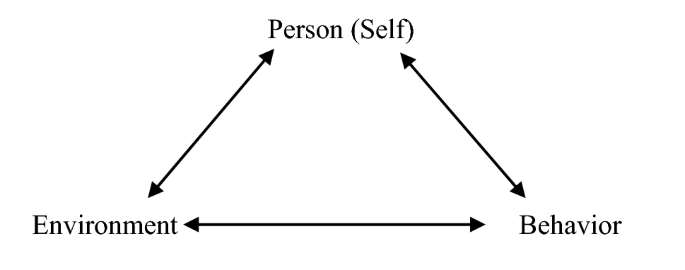 Social Cognitive Theory And Women S Career Choices An Agent Based Model Simulation Springerlink From link.springer.com
Social Cognitive Theory And Women S Career Choices An Agent Based Model Simulation Springerlink From link.springer.com
The Social Cognitive Career Theory SCCT45 provides the framework used in this research. Social cognitive career theory SCCT is a relatively new theory that is aimed at explaining three interrelated aspects of career development. Social-cognitive theory is distinguished from an alternative theory of personality structure and assessment 5-factor theory by articulating the strategies of scientific explanation conceptions of personality structure and dispositions and the assessment practices that differentiate the approaches. Get Your Custom Essay on A Test of Social Cognitive Career Theory Just from 13Page Order Essay Karen M. 1 how basic academic and career interests develop 2 how educational and career choices are made and 3 how academic and career success is obtained. Social Cognitive Career Theory SCCT postulates that the career choice is an unfolding process driven by the interaction among interest self-efficacy and outcome expectations leading to the formation of goals and intentions that serve to sustain behavior over time.
Aspect of human behavior.
Social cognitive career theory SCCT is a relatively new theory that is aimed at explaining three interrelated aspects of career development. One of the more promising career theories that may prove satisfactory in accounting for ethnicity in career development is Banduras 1986 social cognitive theory Lent. Social Cognitive Career Theory was first described by Lent Brown and Hackett in 1996. Social cognitive career theory SCCT. In addition SCCT posited that compromises in personal interests might be required in the career choice process due to contexts. Aspect of human behavior.
 Source: sciencedirect.com
Source: sciencedirect.com
A Test of Social Cognitive Career Theory Lisa Y. One of the more promising career theories that may prove satisfactory in accounting for ethnicity in career development is Banduras 1986 social cognitive theory Lent. The results of statistical tests show that there is an effect of social cognitive career theory on increasing student career decision making. In addition SCCT posited that compromises in personal interests might be required in the career choice process due to contexts. A Test of Social Cognitive Career Theory Lisa Y.
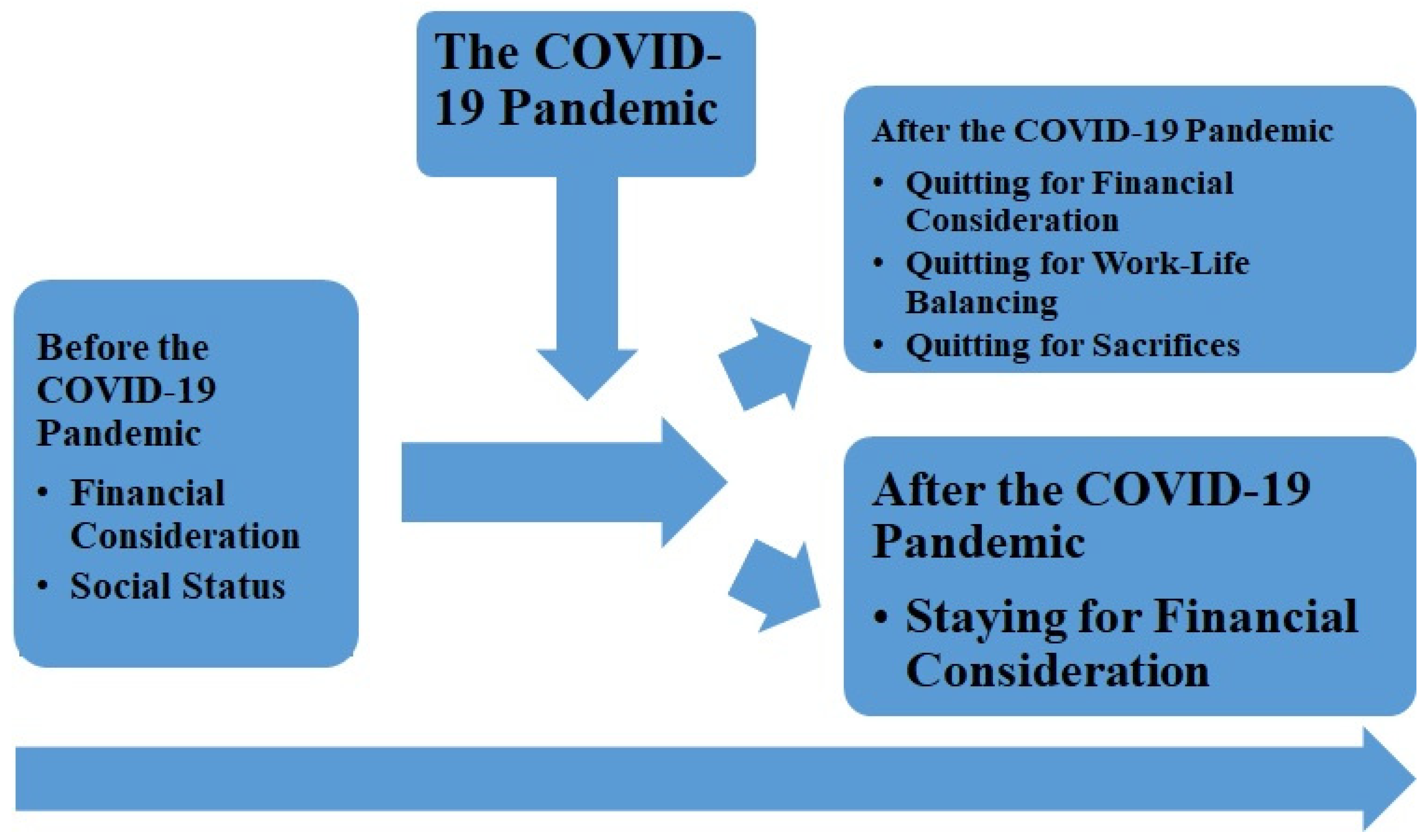 Source: mdpi.com
Source: mdpi.com
Social Cognitive Career Theory was first described by Lent Brown and Hackett in 1996. Banduras Social Cognitive Theory The concept of self efficacy is the focal point of Albert Banduras social cognitive theory. Career Decision Self-Efficacy Scale is used to measure aspects of career decision self-efficacy APPLYING SOCIAL COGNITIVE CAREER THEORY TO WOMEN Studies show occupational self-efficacy predicts interests and career choice Women scored lower on occupational self-efficacy for non-traditional occupations and higher for traditionally female occupations. Social cognitive career theory SCCT. 1 how basic academic and career interests develop 2 how educational and career choices are made and 3 how academic and career success is obtained.
 Source: marcr.net
Source: marcr.net
One of the more promising career theories that may prove satisfactory in accounting for ethnicity in career development is Banduras 1986 social cognitive theory Lent. Lent Brown Hackett 1994 is one of the newer career theories constructed to explain and predict the ways in which individuals form career interests set goals and persist in the work environment. Measures assessing vocational hope. Lent Brown Hackett 1994. Flores The Ohio State University Dont use plagiarized sources.
Source:
The purposes of this special issue were a to examine social cognitive career theorys SCCT relevance to the career development of a diverse range of persons and contexts and b to encourage researchers to extend the theory to new cultures social justice themes and populations that remain underserved or understudied by vocational psychology. Banduras Social Cognitive Theory The concept of self efficacy is the focal point of Albert Banduras social cognitive theory. 112 of the social-cognitive approach to personality also see Carver Scheier 1989. Social cognitive career theory SCCT is a relatively new theory that is aimed at explaining three interrelated aspects of career development. As with many career theories however much of the extant research tends.
 Source: researchgate.net
Source: researchgate.net
OBrien University of Maryland College Park This study tested R. The Social-Cognitive theory is based on social cognitive and cultural elements as the main components of individual personality traits. Lent Brown Hackett 1994. The Social Cognitive Career Theory SCCT45 provides the framework used in this research. Lent and Brown6 demonstrated the SCCT model and provided information for developing an instrument to measure components of the SCCT model.
 Source: researchgate.net
Source: researchgate.net
Hackett 1994 emphasizes cognitive-person variables that enable people to influence their own career development as well as. There are three key components to this. The results of statistical tests show that there is an effect of social cognitive career theory on increasing student career decision making. A Test of Social Cognitive Career Theory Lisa Y. Lent Brown Hackett 1994 is one of the newer career theories constructed to explain and predict the ways in which individuals form career interests set goals and persist in the work environment.
 Source: sciencedirect.com
Source: sciencedirect.com
As a result the most widely-used types of assessments to. Path analyses Continue reading A Test of Social. One of the more promising career theories that may prove satisfactory in accounting for ethnicity in career development is Banduras 1986 social cognitive theory Lent. Vocational hope was proposed as a mechanism through which at-risk youth could develop a positive future orientation an essential component of the career development process Brown Lamp Telander Hacker 2012. Lent and Brown6 demonstrated the SCCT model and provided information for developing an instrument to measure components of the SCCT model.
 Source: marcr.net
Source: marcr.net
This study tested a set of hypothesis derived from the model of academic achievement in mathematics of the Social Cognitive Career Theory in a sample of argentinean middle school students. Serves in the Social Cognitive Career Theory SCCT. Social cognitive career theory SCCT. Social cognitive career theory SCCT is a relatively new theory that is aimed at explaining three interrelated aspects of career development. The Career Development of Mexican American Adolescent Women.
 Source: researchgate.net
Source: researchgate.net
Hackett 1994 emphasizes cognitive-person variables that enable people to influence their own career development as well as extra-person eg contextual variables that enhance or constrain personal agency. The Social-Cognitive theory is based on social cognitive and cultural elements as the main components of individual personality traits. Serves in the Social Cognitive Career Theory SCCT. Social cognitive career theory SCCT. Flores The Ohio State University Karen M.
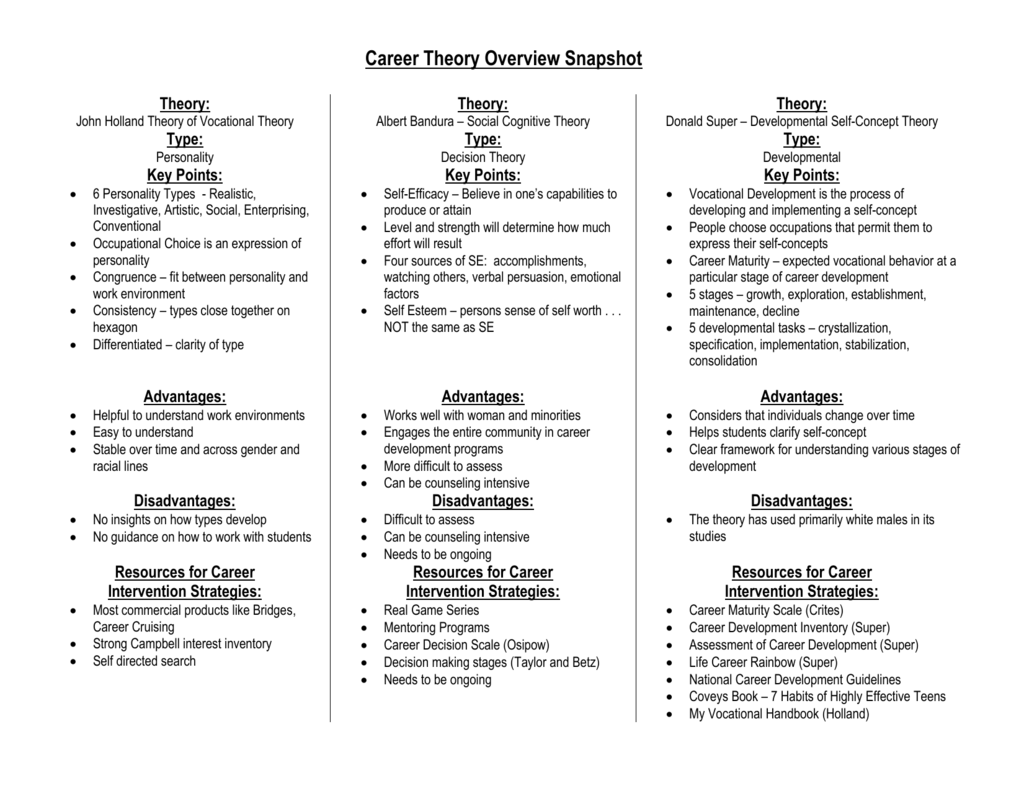 Source: studylib.net
Source: studylib.net
The data analysis technique used was the Wilcoxon test. 1 how basic academic and career interests develop 2 how educational and career choices are made and. OBrien University of Maryland College Park This study tested R. The Social Cognitive Career Theory SCCT45 provides the framework used in this research. The data analysis technique used was the Wilcoxon test.
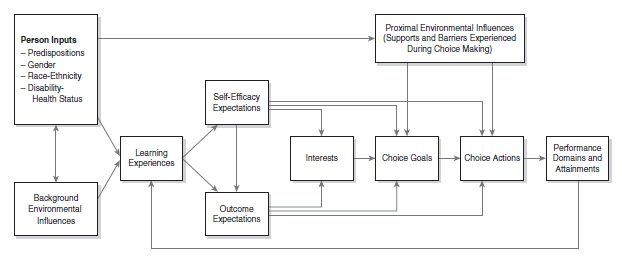 Source: psychology.iresearchnet.com
Source: psychology.iresearchnet.com
Banduras Social Cognitive Theory The concept of self efficacy is the focal point of Albert Banduras social cognitive theory. Social cognitive career theory SCCT is a relatively new theory that is aimed at explaining three interrelated aspects of career development. Lent Brown Hackett 1994. As a result the most widely-used types of assessments to. Hackett 1994 emphasizes cognitive-person variables that enable people to influence their own career development as well as extra-person eg contextual variables that enhance or constrain personal agency.
Source:
OBrien University of Maryland College Park This study tested R. In addition SCCT posited that compromises in personal interests might be required in the career choice process due to contexts. Measures assessing vocational hope. Flores The Ohio State University Dont use plagiarized sources. Get Your Custom Essay on A Test of Social Cognitive Career Theory Just from 13Page Order Essay Karen M.
 Source: researchgate.net
Source: researchgate.net
Vocational hope was proposed as a mechanism through which at-risk youth could develop a positive future orientation an essential component of the career development process Brown Lamp Telander Hacker 2012. The findings of this study prove that the social cognitive career theory is effective in improving student career decision making at VHS Boyolali. 112 of the social-cognitive approach to personality also see Carver Scheier 1989. Hackett 1994 emphasizes cognitive-person variables that enable people to influence their own career development as well as extra-person eg contextual variables that enhance or constrain personal agency. By means of the self system individuals exercise control over their thoughts feelings and actions.
 Source: marcr.net
Source: marcr.net
Aspect of human behavior. Social-cognitive theory is distinguished from an alternative theory of personality structure and assessment 5-factor theory by articulating the strategies of scientific explanation conceptions of personality structure and dispositions and the assessment practices that differentiate the approaches. OBrien University of Maryland College Park This study tested R. Social cognitive career theory SCCT. However SCCT is closely linked to Krumboltz Learning Theory of Career Development.
 Source: cambridge.org
Source: cambridge.org
By means of the self system individuals exercise control over their thoughts feelings and actions. The results of statistical tests show that there is an effect of social cognitive career theory on increasing student career decision making. Flores The Ohio State University Dont use plagiarized sources. Path analyses Continue reading A Test of Social. Banduras Social Cognitive Theory The concept of self efficacy is the focal point of Albert Banduras social cognitive theory.
 Source: marcr.net
Source: marcr.net
Vocational hope was proposed as a mechanism through which at-risk youth could develop a positive future orientation an essential component of the career development process Brown Lamp Telander Hacker 2012. By means of the self system individuals exercise control over their thoughts feelings and actions. Hackett 1994 emphasizes cognitive-person variables that enable people to influence their own career development as well as. This study tested a set of hypothesis derived from the model of academic achievement in mathematics of the Social Cognitive Career Theory in a sample of argentinean middle school students. Social cognitive career theory SCCT.
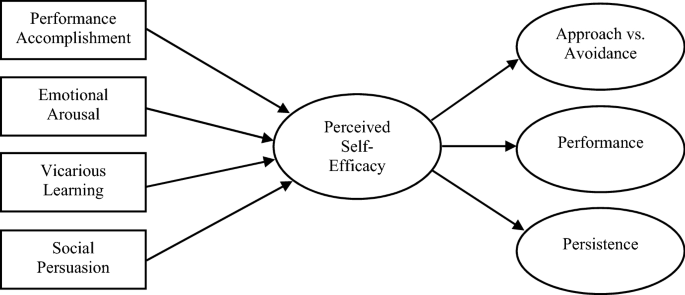 Source: link.springer.com
Source: link.springer.com
Specific to our research questions are the. As a result the most widely-used types of assessments to. Social Cognitive Career Theory was first described by Lent Brown and Hackett in 1996. Social Cognitive Career Theory. The theory incorporates a variety of concepts eg interests abilities values environmental factors that.
 Source: sciencedirect.com
Source: sciencedirect.com
Flores The Ohio State University Dont use plagiarized sources. Career Decision Self-Efficacy Scale is used to measure aspects of career decision self-efficacy APPLYING SOCIAL COGNITIVE CAREER THEORY TO WOMEN Studies show occupational self-efficacy predicts interests and career choice Women scored lower on occupational self-efficacy for non-traditional occupations and higher for traditionally female occupations. Serves in the Social Cognitive Career Theory SCCT. Although the theory has yielded a steady stream of inquiry and practical. The purposes of this special issue were a to examine social cognitive career theorys SCCT relevance to the career development of a diverse range of persons and contexts and b to encourage researchers to extend the theory to new cultures social justice themes and populations that remain underserved or understudied by vocational psychology.
This site is an open community for users to submit their favorite wallpapers on the internet, all images or pictures in this website are for personal wallpaper use only, it is stricly prohibited to use this wallpaper for commercial purposes, if you are the author and find this image is shared without your permission, please kindly raise a DMCA report to Us.
If you find this site serviceableness, please support us by sharing this posts to your favorite social media accounts like Facebook, Instagram and so on or you can also bookmark this blog page with the title social cognitive career theory assessments by using Ctrl + D for devices a laptop with a Windows operating system or Command + D for laptops with an Apple operating system. If you use a smartphone, you can also use the drawer menu of the browser you are using. Whether it’s a Windows, Mac, iOS or Android operating system, you will still be able to bookmark this website.